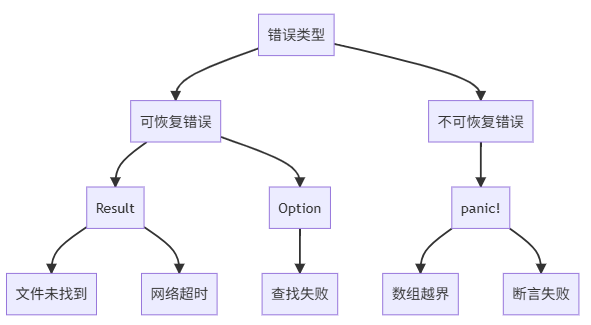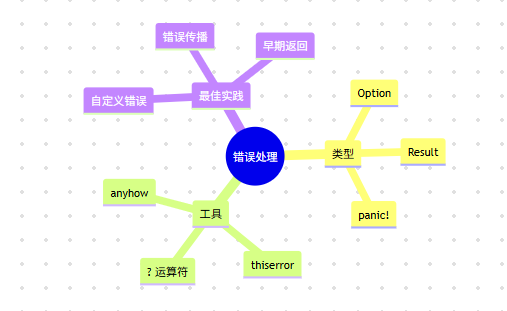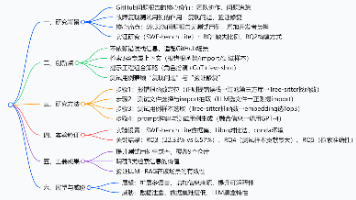Rust 错误处理完全指南:从 Result 到自定义错误类型
本文深入解析Rust的错误处理机制,重点介绍了Result和Option类型的用法,以及?运算符的工作原理。通过对比其他语言的异常处理方式,突出Rust显式错误处理的优势。文章详细讲解如何设计自定义错误类型(包括简单枚举、实现标准trait和使用thiserror/anyhow库),并提供了错误处理最佳实践和实战案例(HTTP客户端、数据验证器等)。最后讨论了panic的合理使用场景和自定义处理方
·
目录
📝 摘要
Rust 通过类型系统强制显式错误处理,避免了传统语言中常见的异常抛出和隐式错误传播问题。本文将深入讲解 Rust 的错误处理哲学、Result 和 Option 类型的使用、? 运算符的工作原理以及如何设计优雅的自定义错误类型,帮助读者构建健壮的 Rust 应用程序。
一、Rust 错误处理哲学
1.1 可恢复错误 vs 不可恢复错误
错误分类:

对比表:
| 特性 | 可恢复错误 | 不可恢复错误 |
|---|---|---|
| 表示方式 | Result<T, E> / Option<T> |
panic! |
| 处理方式 | 显式处理 | 终止程序 |
| 适用场景 | 预期的错误 | 程序逻辑错误 |
| 示例 | 文件不存在 | 内存安全违规 |
1.2 与其他语言对比
// Rust:显式错误处理
fn read_file(path: &str) -> Result<String, std::io::Error> {
std::fs::read_to_string(path)
}
fn main() {
match read_file("config.txt") {
Ok(content) => println!("内容: {}", content),
Err(e) => eprintln!("错误: {}", e),
}
}
# Python:异常处理
def read_file(path):
try:
with open(path) as f:
return f.read()
except FileNotFoundError as e:
print(f"错误: {e}")
return None
// Java:受检异常
public String readFile(String path) throws IOException {
return Files.readString(Paths.get(path));
}
二、Option 类型深度剖析
2.1 Option 基础
fn main() {
let some_number = Some(5);
let no_number: Option<i32> = None;
// 模式匹配
match some_number {
Some(value) => println!("有值: {}", value),
None => println!("无值"),
}
// 常用方法
println!("是否有值: {}", some_number.is_some());
println!("是否无值: {}", some_number.is_none());
// unwrap(危险:None时会panic)
// let value = no_number.unwrap();
// unwrap_or:提供默认值
let value = no_number.unwrap_or(0);
println!("值或默认: {}", value);
// unwrap_or_else:惰性计算默认值
let value = no_number.unwrap_or_else(|| {
println!("计算默认值");
42
});
// expect:带自定义错误消息
// let value = no_number.expect("期望有值");
}
2.2 Option 链式操作
fn main() {
let numbers = vec![Some(1), Some(2), None, Some(4)];
// map:转换内部值
let doubled: Vec<Option<i32>> = numbers.iter()
.map(|opt| opt.map(|n| n * 2))
.collect();
println!("加倍: {:?}", doubled);
// and_then(flatMap):链式操作
fn square_if_even(n: i32) -> Option<i32> {
if n % 2 == 0 {
Some(n * n)
} else {
None
}
}
let result = Some(4).and_then(square_if_even);
println!("偶数平方: {:?}", result); // Some(16)
let result = Some(3).and_then(square_if_even);
println!("奇数平方: {:?}", result); // None
// filter:条件过滤
let value = Some(10).filter(|&x| x > 5);
println!("过滤后: {:?}", value); // Some(10)
// or:提供备选Option
let backup = Some(3).or(Some(5));
println!("备选: {:?}", backup); // Some(3)
let backup = None.or(Some(5));
println!("备选: {:?}", backup); // Some(5)
}
2.3 实战示例:安全的配置访问
use std::collections::HashMap;
#[derive(Debug)]
struct Config {
settings: HashMap<String, String>,
}
impl Config {
fn new() -> Self {
let mut settings = HashMap::new();
settings.insert("host".to_string(), "localhost".to_string());
settings.insert("port".to_string(), "8080".to_string());
Config { settings }
}
fn get(&self, key: &str) -> Option<&String> {
self.settings.get(key)
}
fn get_or_default(&self, key: &str, default: &str) -> String {
self.get(key)
.map(|s| s.clone())
.unwrap_or_else(|| default.to_string())
}
fn get_port(&self) -> Option<u16> {
self.get("port")
.and_then(|s| s.parse().ok())
}
}
fn main() {
let config = Config::new();
println!("主机: {}", config.get_or_default("host", "0.0.0.0"));
println!("调试: {}", config.get_or_default("debug", "false"));
if let Some(port) = config.get_port() {
println!("端口号: {}", port);
}
}
三、Result 类型完全指南
3.1 Result 基础
use std::fs::File;
use std::io::{self, Read};
fn read_username_from_file(path: &str) -> Result<String, io::Error> {
let mut file = File::open(path)?; // ? 运算符
let mut username = String::new();
file.read_to_string(&mut username)?;
Ok(username)
}
fn main() {
match read_username_from_file("username.txt") {
Ok(username) => println!("用户名: {}", username),
Err(e) => eprintln!("读取失败: {}", e),
}
}
3.2 ? 运算符详解
工作原理:
// 使用 ? 运算符
fn function_with_question_mark() -> Result<(), std::io::Error> {
let file = File::open("file.txt")?;
Ok(())
}
// 等价于
fn function_expanded() -> Result<(), std::io::Error> {
let file = match File::open("file.txt") {
Ok(f) => f,
Err(e) => return Err(e),
};
Ok(())
}
? 运算符的类型转换:
use std::error::Error;
use std::fs::File;
use std::io;
// ? 会自动调用 From trait 进行类型转换
fn read_file() -> Result<String, Box<dyn Error>> {
let mut file = File::open("file.txt")?; // io::Error
let mut content = String::new();
file.read_to_string(&mut content)?; // io::Error
Ok(content)
}
可视化流程:
graph TD
A[执行表达式] --> B{Result?}
B -->|Ok(value)| C[返回 value]
B -->|Err(e)| D[提前返回 Err]
C --> E[继续执行]
D --> F[函数结束]
3.3 Result 方法链
fn main() {
let result: Result<i32, &str> = Ok(10);
// map:转换 Ok 值
let doubled = result.map(|x| x * 2);
println!("加倍: {:?}", doubled); // Ok(20)
// map_err:转换错误
let mapped_err = Err("error").map_err(|e| format!("错误: {}", e));
println!("{:?}", mapped_err);
// and_then:链式操作
fn divide(a: i32, b: i32) -> Result<i32, String> {
if b == 0 {
Err("除数为零".to_string())
} else {
Ok(a / b)
}
}
let result = Ok(10)
.and_then(|x| divide(x, 2))
.and_then(|x| divide(x, 0));
println!("链式计算: {:?}", result); // Err
// or_else:错误恢复
let recovered = Err("first error")
.or_else(|_| Err("second error"))
.or(Ok(42));
println!("恢复: {:?}", recovered); // Ok(42)
}
四、自定义错误类型
4.1 简单枚举错误
#[derive(Debug)]
enum MathError {
DivisionByZero,
NegativeSquareRoot,
Overflow,
}
fn divide(a: f64, b: f64) -> Result<f64, MathError> {
if b == 0.0 {
Err(MathError::DivisionByZero)
} else {
Ok(a / b)
}
}
fn sqrt(x: f64) -> Result<f64, MathError> {
if x < 0.0 {
Err(MathError::NegativeSquareRoot)
} else {
Ok(x.sqrt())
}
}
fn main() {
match divide(10.0, 0.0) {
Ok(result) => println!("结果: {}", result),
Err(MathError::DivisionByZero) => eprintln!("❌ 除数不能为零"),
Err(e) => eprintln!("❌ 数学错误: {:?}", e),
}
}
4.2 实现 Display 和 Error trait
use std::fmt;
use std::error::Error;
#[derive(Debug)]
enum DataError {
NotFound(String),
InvalidFormat { field: String, reason: String },
DatabaseError(String),
}
impl fmt::Display for DataError {
fn fmt(&self, f: &mut fmt::Formatter) -> fmt::Result {
match self {
DataError::NotFound(item) => {
write!(f, "未找到数据: {}", item)
},
DataError::InvalidFormat { field, reason } => {
write!(f, "字段 '{}' 格式无效: {}", field, reason)
},
DataError::DatabaseError(msg) => {
write!(f, "数据库错误: {}", msg)
},
}
}
}
impl Error for DataError {}
fn fetch_user(id: u32) -> Result<String, DataError> {
if id == 0 {
return Err(DataError::NotFound(format!("用户ID: {}", id)));
}
Ok(format!("User-{}", id))
}
fn main() {
match fetch_user(0) {
Ok(user) => println!("✓ {}", user),
Err(e) => eprintln!("✗ {}", e),
}
}
4.3 使用 thiserror 库
[dependencies]
thiserror = "1.0"
use thiserror::Error;
#[derive(Error, Debug)]
enum AppError {
#[error("IO错误: {0}")]
Io(#[from] std::io::Error),
#[error("解析错误: {0}")]
Parse(#[from] std::num::ParseIntError),
#[error("用户 '{user}' 未找到")]
UserNotFound { user: String },
#[error("无效的配置项: {field}")]
InvalidConfig { field: String },
#[error("数据库错误: {0}")]
Database(String),
}
fn process_file(path: &str) -> Result<i32, AppError> {
let content = std::fs::read_to_string(path)?; // 自动转换 io::Error
let number: i32 = content.trim().parse()?; // 自动转换 ParseIntError
Ok(number * 2)
}
fn main() {
match process_file("number.txt") {
Ok(result) => println!("结果: {}", result),
Err(e) => eprintln!("错误: {}", e),
}
}
4.4 使用 anyhow 库(应用级错误处理)
[dependencies]
anyhow = "1.0"
use anyhow::{Context, Result, bail};
fn read_config(path: &str) -> Result<String> {
std::fs::read_to_string(path)
.context(format!("无法读取配置文件: {}", path))?;
Ok("配置内容".to_string())
}
fn validate_config(content: &str) -> Result<()> {
if content.is_empty() {
bail!("配置文件为空");
}
Ok(())
}
fn main() -> Result<()> {
let config = read_config("config.toml")?;
validate_config(&config)?;
println!("✓ 配置加载成功");
Ok(())
}
五、错误处理最佳实践
5.1 错误传播策略
use std::error::Error;
use std::fs::File;
use std::io::{self, Read};
// ✓ 策略1:使用 ? 运算符传播错误
fn read_file_propagate(path: &str) -> Result<String, io::Error> {
let mut file = File::open(path)?;
let mut content = String::new();
file.read_to_string(&mut content)?;
Ok(content)
}
// ✓ 策略2:转换为自定义错误
#[derive(Debug)]
enum FileError {
IoError(io::Error),
EmptyFile,
}
impl From<io::Error> for FileError {
fn from(error: io::Error) -> Self {
FileError::IoError(error)
}
}
fn read_file_custom(path: &str) -> Result<String, FileError> {
let content = std::fs::read_to_string(path)?;
if content.is_empty() {
return Err(FileError::EmptyFile);
}
Ok(content)
}
// ✓ 策略3:使用 Box<dyn Error>(灵活但类型擦除)
fn read_file_boxed(path: &str) -> Result<String, Box<dyn Error>> {
let content = std::fs::read_to_string(path)?;
Ok(content)
}
5.2 多个错误类型的处理
use std::num::ParseIntError;
use std::io;
fn read_and_parse(path: &str) -> Result<i32, Box<dyn std::error::Error>> {
let content = std::fs::read_to_string(path)?; // io::Error
let number: i32 = content.trim().parse()?; // ParseIntError
Ok(number)
}
// 更好的方式:自定义错误枚举
#[derive(Debug)]
enum ProcessError {
Io(io::Error),
Parse(ParseIntError),
}
impl From<io::Error> for ProcessError {
fn from(e: io::Error) -> Self {
ProcessError::Io(e)
}
}
impl From<ParseIntError> for ProcessError {
fn from(e: ParseIntError) -> Self {
ProcessError::Parse(e)
}
}
fn read_and_parse_typed(path: &str) -> Result<i32, ProcessError> {
let content = std::fs::read_to_string(path)?;
let number: i32 = content.trim().parse()?;
Ok(number)
}
5.3 早期返回模式
fn validate_user(
username: &str,
email: &str,
age: u32,
) -> Result<(), String> {
// 早期返回验证失败
if username.is_empty() {
return Err("用户名不能为空".to_string());
}
if !email.contains('@') {
return Err("邮箱格式无效".to_string());
}
if age < 18 {
return Err("年龄必须大于18岁".to_string());
}
// 所有验证通过
Ok(())
}
fn main() {
let users = vec![
("", "user@example.com", 25),
("alice", "invalid-email", 25),
("bob", "bob@example.com", 16),
("charlie", "charlie@example.com", 30),
];
for (username, email, age) in users {
match validate_user(username, email, age) {
Ok(_) => println!("✓ 用户 {} 验证通过", username),
Err(e) => println!("✗ 验证失败: {}", e),
}
}
}
六、实战案例
6.1 案例1:HTTP 客户端错误处理
use std::error::Error;
use std::fmt;
#[derive(Debug)]
enum HttpError {
NetworkError(String),
Timeout,
InvalidResponse { status: u16, body: String },
ParseError(String),
}
impl fmt::Display for HttpError {
fn fmt(&self, f: &mut fmt::Formatter) -> fmt::Result {
match self {
HttpError::NetworkError(msg) => write!(f, "网络错误: {}", msg),
HttpError::Timeout => write!(f, "请求超时"),
HttpError::InvalidResponse { status, body } => {
write!(f, "无效响应 (状态码 {}): {}", status, body)
},
HttpError::ParseError(msg) => write!(f, "解析错误: {}", msg),
}
}
}
impl Error for HttpError {}
struct HttpClient;
impl HttpClient {
fn get(&self, url: &str) -> Result<String, HttpError> {
// 模拟HTTP请求
if url.contains("timeout") {
return Err(HttpError::Timeout);
}
if url.contains("404") {
return Err(HttpError::InvalidResponse {
status: 404,
body: "Not Found".to_string(),
});
}
Ok(format!("Response from {}", url))
}
fn get_with_retry(
&self,
url: &str,
max_retries: u32,
) -> Result<String, HttpError> {
let mut attempts = 0;
loop {
match self.get(url) {
Ok(response) => return Ok(response),
Err(HttpError::Timeout) if attempts < max_retries => {
attempts += 1;
println!("⏱️ 超时,重试 {}/{}", attempts, max_retries);
std::thread::sleep(std::time::Duration::from_secs(1));
},
Err(e) => return Err(e),
}
}
}
}
fn main() {
let client = HttpClient;
let urls = vec![
"https://example.com",
"https://example.com/timeout",
"https://example.com/404",
];
for url in urls {
match client.get_with_retry(url, 3) {
Ok(response) => println!("✓ {}", response),
Err(e) => eprintln!("✗ {}", e),
}
}
}
6.2 案例2:数据验证器
use thiserror::Error;
#[derive(Error, Debug)]
enum ValidationError {
#[error("字段 '{field}' 不能为空")]
Empty { field: String },
#[error("字段 '{field}' 长度必须在 {min} 到 {max} 之间")]
LengthOutOfRange { field: String, min: usize, max: usize },
#[error("字段 '{field}' 格式无效: {reason}")]
InvalidFormat { field: String, reason: String },
#[error("字段 '{field}' 的值必须大于 {min}")]
TooSmall { field: String, min: i32 },
}
struct Validator;
impl Validator {
fn validate_not_empty(field: &str, value: &str) -> Result<(), ValidationError> {
if value.is_empty() {
Err(ValidationError::Empty {
field: field.to_string(),
})
} else {
Ok(())
}
}
fn validate_length(
field: &str,
value: &str,
min: usize,
max: usize,
) -> Result<(), ValidationError> {
let len = value.len();
if len < min || len > max {
Err(ValidationError::LengthOutOfRange {
field: field.to_string(),
min,
max,
})
} else {
Ok(())
}
}
fn validate_email(field: &str, value: &str) -> Result<(), ValidationError> {
if !value.contains('@') || !value.contains('.') {
Err(ValidationError::InvalidFormat {
field: field.to_string(),
reason: "必须包含@和.".to_string(),
})
} else {
Ok(())
}
}
}
#[derive(Debug)]
struct UserRegistration {
username: String,
email: String,
age: u32,
}
impl UserRegistration {
fn validate(&self) -> Result<(), Vec<ValidationError>> {
let mut errors = Vec::new();
if let Err(e) = Validator::validate_not_empty("username", &self.username) {
errors.push(e);
}
if let Err(e) = Validator::validate_length("username", &self.username, 3, 20) {
errors.push(e);
}
if let Err(e) = Validator::validate_email("email", &self.email) {
errors.push(e);
}
if self.age < 18 {
errors.push(ValidationError::TooSmall {
field: "age".to_string(),
min: 18,
});
}
if errors.is_empty() {
Ok(())
} else {
Err(errors)
}
}
}
fn main() {
let user = UserRegistration {
username: "ab".to_string(),
email: "invalid-email".to_string(),
age: 16,
};
match user.validate() {
Ok(_) => println!("✓ 验证通过"),
Err(errors) => {
println!("✗ 验证失败 ({} 个错误):", errors.len());
for error in errors {
println!(" - {}", error);
}
},
}
}
七、panic! 与 unwrap
7.1 何时使用 panic!
fn divide(a: i32, b: i32) -> i32 {
if b == 0 {
panic!("除数不能为零!"); // ❌ 库代码中避免
}
a / b
}
// ✓ 更好的方式
fn divide_safe(a: i32, b: i32) -> Result<i32, String> {
if b == 0 {
Err("除数不能为零".to_string())
} else {
Ok(a / b)
}
}
// ✓ 合理使用panic:程序逻辑错误
fn get_config_must_exist() -> String {
std::env::var("REQUIRED_CONFIG")
.expect("REQUIRED_CONFIG环境变量必须设置")
}
7.2 自定义 panic 处理
use std::panic;
fn main() {
// 设置panic钩子
panic::set_hook(Box::new(|panic_info| {
if let Some(s) = panic_info.payload().downcast_ref::<&str>() {
println!("🚨 Panic发生: {}", s);
} else {
println!("🚨 Panic发生");
}
if let Some(location) = panic_info.location() {
println!(" 位置: {}:{}", location.file(), location.line());
}
}));
// 捕获panic
let result = panic::catch_unwind(|| {
panic!("测试panic");
});
match result {
Ok(_) => println!("没有panic"),
Err(_) => println!("捕获到panic"),
}
}
八、总结与讨论
Rust的错误处理机制是其类型安全的核心体现:
✅ 显式优于隐式:强制处理错误
✅ 类型安全:编译期保证错误处理
✅ 零成本抽象:Result编译为高效代码
✅ 灵活表达:支持复杂错误场景
核心概念总结:

讨论问题:
- 何时使用
unwrap()是合理的? thiserrorvsanyhow:如何选择?- 如何在异步代码中优雅地处理错误?
欢迎分享经验!💬
参考链接
- Rust Book - Error Handling:https://doc.rust-lang.org/book/ch09-00-error-handling.html
- thiserror文档:https://docs.rs/thiserror
- anyhow文档:https://docs.rs/anyhow
更多推荐
 已为社区贡献1条内容
已为社区贡献1条内容







所有评论(0)